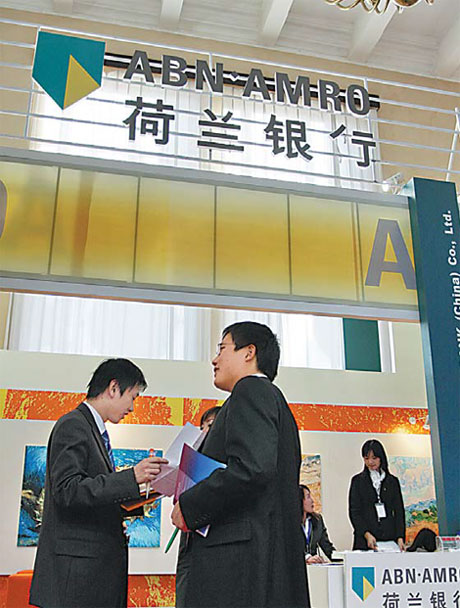Green-field hopes in land of the tulips
Dutch government opens agricultural, manufacturing sectors to cooperative opportunities with China
Chinese businesses invested a record 1.1 billion euros in the Netherlands last year, the country's Foreign Investment Agency says.
Thirty-seven Chinese businesses invested about 197 million euros in green-field investments, creating 500 new jobs in the country over the next three years, says Guy Wittich, the agency's consul and executive director for China.
|
A booth for Dutch bank ABN AMRO at a Beijing trade fair. Provided to China Daily |
Green-field investments are those in which new operational facilities are built from the ground up.
About 900 million euros were spent on mergers and acquisitions over the year. Among these was China National Cereals, Oils and Foodstuffs Corp, China's largest supplier of diversified agricultural and food products and services, buying 51 percent of the grains grader Nidera BV.
More than 500 Chinese companies set up operations in the Netherlands by the end of last year. In the past five years, the agency has helped facilitate the addition of another 40 Chinese companies, with an average of 72 million euros new investments every year, creating 450 jobs a year.
Andre Driessen, minister and deputy head of missions of the Netherlands embassy in Beijing, says: "We welcome them as they contribute to our economy by creating new jobs, cooperate with Dutch enterprises in developing new technologies and ventures, and provide better access for their Dutch partner companies to the Chinese market."
Most Chinese businesses in the Netherlands are involved in electronics, industrial engineering, agriculture, food, information and communications technology and the chemical industry.
The Netherlands was the third-biggest investment destination for Chinese businesses in Europe last year, after Britain and Italy, says the advisory firm Rhodium Group of New York. China has been the second-largest source of investment for the Netherlands for the past four years.
Research and innovation account for a large portion of China's investment in the country, as more companies begin to collaborate with high-tech businesses and universities there.
Last year Chinese companies set up 16 sales centers, seven R&D centers, six delivery centers and five European headquarters in Europe.
As the Dutch government goes all out to boost its knowledge economy, more Chinese companies have sought to work with Dutch high-tech companies and colleges. For example, the Chinese dairy giant Yili Industrial Group set up the first overseas Chinese dairy R&D center in the Netherlands in collaboration with Wageningen University.
Lilianne Ploumen, the Dutch Minister for Foreign Trade and Development Cooperation, says her government expects more innovative companies to base their innovation centers in the country.
Li Ming, head of Europe and Middle East for the Chinese company Hanergy Holding Group, which set up its European headquarters in 2012, after having been in the country for about 11 years, says the Netherlands is an ideal steppingstone for companies wanting to do business in Europe. Hanergy employs 50 people in the country, which Li says is located at the center of Europe's most important economies, has a large pool of talent and has attractive tax policies.
Mei Xinyu, who specializes in international trade and economic cooperation at China's Ministry of Commerce, says European countries continue to welcome Chinese investment as the economies of Europe continue to falter.
"The Dutch economy's strength is that it is strong in innovation and in high-tech industries, which are very attractive to Chinese companies," Mei says.
"The competence of Chinese companies in technological innovation is also growing, so Chinese investors are more willing to invest in high-tech companies in the Netherlands, then link that with China's abilities in manufacturing and marketing to generate profits."
The Netherlands understands that free exchanges and collaboration with other countries are the foundation of economic and social well-being, Driessen says, so it will always be open to working with China to create opportunities in agriculture, manufacturing and services.
He cites "a focus on innovation, high-technology solutions and Dutch creativity, which makes our way of doing business interesting, transparent and straightforward".
Wittich says there have been several new trends in Chinese investment in the past year. Chinese companies' operations in the Netherlands are being given additional functions, such as becoming delivery centers for Europe, or offices have been turned into headquarters for EU or regional R&D centers, rather than being limited to marketing divisions for Europe.
More mergers can be expected in agriculture and food, automotive parts and financial services, he says, and more Chinese companies are likely to dip their toes into the waters of the Dutch real estate market.
Mark Rutte, the country's prime minister, will visit China from March 24 to 29. He will visit Chinese companies in Shanghai and Shenzhen.
Contact the writers through chenyingqun@chinadaily.com.cn



















